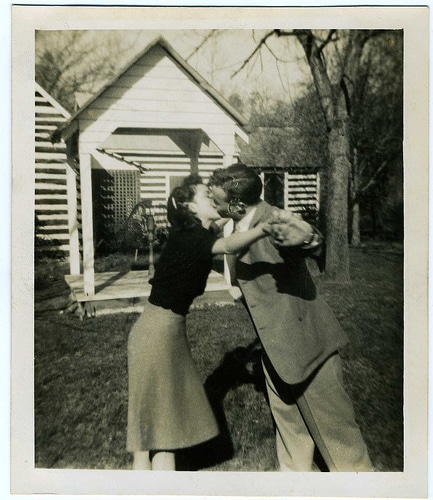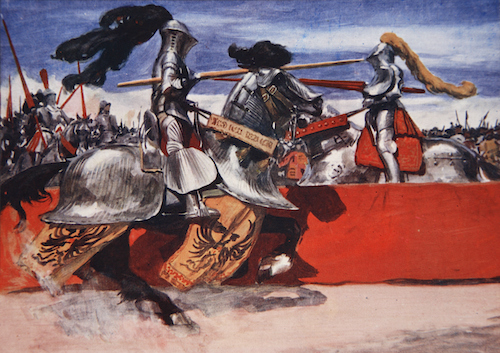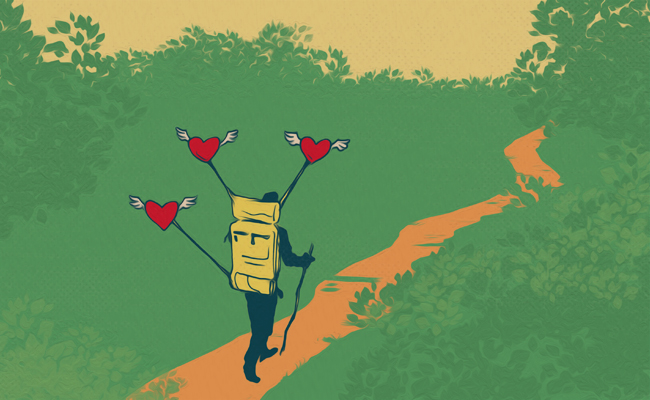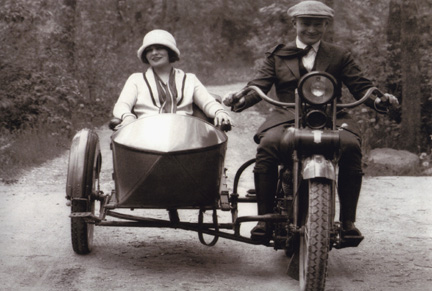Love. Whether in the form of poems, moony songs, philosophical treatises, romantic notes, or angry letters, no aspect of human life has had quite so much ink spilled over it. It has since time immemorial been a driving force of life, and for just as long remained utterly mysterious, an experience that could be mused over but not truly understood.
But in the last decade, scientists have finally gotten to peer into the neurological nature of love by scanning the brains of those in the throes of it. These scans have confirmed what anyone who has fallen head over heels has experienced firsthand: love is a wild and woolly ride.
As it turns out, your brain reacts to love the same way it reacts to cocaine. So you weren’t nuts to feel addicted to your beloved nor the physical pain of withdrawal when she left you. Love lights up the reward centers of your brain and douses them in dopamine, as well as serotonin and oxytocin. These neural fireworks set off feelings of euphoria, pleasure, craving, recklessness, and obsession.
So when you’re smitten, you’re literally flying high. But the high can’t last, and it isn’t designed to. Or so it was thought.
Researchers theorized that intense romantic love was only a temporary stage designed to make mate selection more efficient, and that once this powerful force brought two people together, it inevitably mellowed into attachment or “companionate love,” a stage that develops as time passes and the couple’s lives become intertwined. As opposed to the intensity of romantic love, companionate love is marked by a happy togetherness and a comfortable stability that is designed to keep the couple together to raise their children.
And indeed, that progression from romantic to companionate love can be observed in the majority of the population. When researchers looked at the brains of those who had been together for years, the scans confirmed their theory; the regions that used to light up with romantic love had dimmed and been replaced by activity in the centers for long-term attachment and pair-bonding. Passionate, romantic love, researchers concluded, had an average shelf-life of about 12-18 months–up to four years at the absolute most.
But what about the elderly couple holding hands that your girlfriend points at and says, “Aww, I want to be like them?” The couples who claim to still be head over heels for each other even after a few decades together? Are they lying? Fooling themselves? Is it possible to thwart evolutionary destiny?
Romantic Love Can Last
In 2010, researchers conducted a study to answer those questions. They brought in 17 people who claimed to still be in love with their spouses, with whom they had been with an average of 21 years, and scanned their brains with a functional MRI machine while each participant gazed at a picture of his or her beloved.
What they found surprised them; in key ways, the participants’ brains looked very similar to the brains of those who had just recently fallen in love. The important reward and motivation regions of their gray matter still lit up in the very same way.
They were not identical, however. Regions of the brain that are associated with anxiety and fear, which are active in the newly smitten, did not light up in those who had been with their partner a long time. These longer-term couples were still in love, but they were no longer afraid of losing or being separated from their partner—the fear of being dumped had passed. Instead, not only were the attachment and pair-bonding regions active, just as they were in the long-term companionate love couples, the regions associated with pleasure and pain-relief–opiate-rich sites that are also activated by primary rewards like morphine–lit up as well.
In other words, those who were still passionately in love after decades in a relationship enjoyed the intensity of romantic love, coupled with the stable attachment of companionate love, without the anxiety and obsession that accompanies new love, and with the added bonus of natural painkillers. A pretty nice state to be in, no?
Of course plenty of people are happy with just companionate love. Years with their spouse have forged a solid friendship and a comfortable groove between them.
Certainly there’s nothing wrong with companionate love; if it keeps you together and you’re happy, then great. And yet there are certainly compelling reasons to seek something beyond simply “good enough:”
Love is the grease in the gears of life. There are two central drivers of the actions we take in life: love and duty. Both are important, but love is the higher motivation and the one that makes life, and our relationships, easy and joyful.
In college I had an acquaintance I was not particularly fond of who called me late one night; he was at the airport an hour away and his ride had fallen through…could I come pick him up? I did so. But I went out the door grumbling and grumbled all the way to the airport. A few years later, when Kate and I were dating, she called me with the same request. It was even later at night. But this time I went rushing out the door and smiled the whole way. What was the difference? Duty versus love. Picking up Kate didn’t even slightly register as an inconvenience.
The sage William George Jordan puts the difference so well:
“Duty is forced, like a pump; love is spontaneous, like a fountain. Duty is prescribed and formal; it is part of the red tape of life. It means running on moral rails.
Analyze, if you will, any of the great historic instances of loyalty to duty, and whenever they ring true you will find the presence of the real element that made the act almost divine. It was duty—plus love.
Duty is a hard, mechanical process for making men do things that love would make easy. It is a poor understudy to love. It is not a high enough motive with which to inspire humanity. Duty is the body to which love is the soul. Love, in the divine alchemy of life, transmutes all duties into privileges, all responsibilities into joys.
The workman who drops his tools at the stroke of twelve, as suddenly as if he had been struck by lightning may be doing his duty—but he is doing nothing more. No man has made a great success of his life or a fit preparation for immortality by doing merely his duty. He must do that—and more. If he puts love into his work, the ‘more’ will be easy.”
When you remain deeply in love with someone, your responsibilities and obligations to them flow naturally and spontaneously. The more love in your relationship, the more grease there is on the gears of life, and the smoother things go in all areas of it. Lose that grease, and the gears must grind it out. Many people have said that marriage is hard. But this has not been my experience at all. Marriage has been easy. Truly.
Faithfulness Boost. This is related to the above point. The more the gears dryly grind together, the greater the chance of the machine breaking down.
Prairie voles are generally monogamous and mate with a lifelong partner. When they pair off, the dopamine in their brains increases by 50%, which solidifies this bond. But when they are injected with a chemical that blocks the production of dopamine, they’ll readily dump their partner to mate with others.
Of course humans aren’t prairies voles; when love and dopamine dry up, duty stands in as a safety net to keep us together. But far better never to have to endure that temptation and test that safety net by keeping our brains soaked with the chemicals of love.
Increased confidence and strength. When you first fell in love with your girl, did you feel like there was nothing in the world you couldn’t do? Did you feel awesome about yourself and ready to take on endeavors that used to seem daunting?
There’s a reason for that. Love de-activates regions within the amygdala that are associated with fear, increasing your confidence and willingness to take risks. Love buoys you up and makes you feel ready to take on the world. Men have done many a great thing in the name of love.
How to Make Love Last
So romantic love can last forever. This can either be validating or depressing news, depending on the current state of your relationship. As Dr. Arthur Aron, co-author of the study that proved the possible longevity of romantic love put it, “This is not something long term couples want to hear. Nobody wants to hear about couples doing better than they are. We all like to believe we’re the best.”
But if the passions of your relationship have cooled, there’s no need to simply mope about it. There are things you can do to heat things back up and keep the fires of romantic love burning. Romantic love is fueled by the release of dopamine, so one of the keys to sustaining it is to keep that chemical flowing. Here are a few ways to do that, along with other tips researchers have given for keeping romantic love strong.
1. Pick the right woman. Obviously the most important factor of all! The easiest way to keep the flame burning is to start with a roaring fire, and simply tend to it rather than having to poke at a cold bed of ashes for the next 50 years. When you get hitched, make sure she’s the one.
2. Keep things going in the bedroom. Dr. Aron’s studies have shown that the frequency of sex is a big factor in keeping romantic love alive. The couples in his study who were still madly in love after two decades together had sex an average of 2.2 times a week. That’s above the national average, but still a very attainable goal for any couple.
Of course this is a bit of the chicken and egg argument; do couples who are still in love have more sex, or does having more sex make them more in love? Likely it works in tandem, with one begetting the other.
3. Be a Married Master Mind. The biggest key to lasting love, Aron has found, is how much the partners in a relationship help each other expand their sense of self. We should look for a partner that helps us “increase our store of ideas, experiences, skills, interests and resources in order to accomplish an ever evolving set of goals.” This is what we discussed in our post about becoming a Married Master Mind. This concept is incredibly important–be sure to check out that article and really think it over.
4. Idealize each other. Studies have shown that the happiest couples are those who see each other in the best possible light. This is a matter of attitude, and something you can work on changing today. Spend less time dwelling on the things she does that annoy you, and more time recognizing all the good she does, all the things you love about her. Kate and I still say to each other, “You’re perfect.” Clearly, neither of us is. But we still sometimes see each other in that generous light.
5. Keep a sense a humor. Laughing is a sure-fire way to release dopamine, and I credit it as a big part of the success of our marriage. We make each other laugh every day, and even when we fight, we have trouble sustaining a proper angry face without dissolving into fits of laughter and the realization that whatever we were fighting about was pretty dumb.
6. Keep things fresh. Enjoying new experiences together will release dopamine and bring back the butterflies you felt when you first started dating. You’ve probably experienced this when you’ve gone on vacation with your partner; you likely felt those old romantic feelings surge again. It wasn’t just because you got away from work and the kids, but because you were doing something new and different, which turned on the dopamine faucet. You don’t have to go on a cruise to get this effect though. Instead of doing the same old thing for date night, try a new restaurant, visit a museum you’ve never been to before, or find a new trail to hike.
Tags: Marriage







